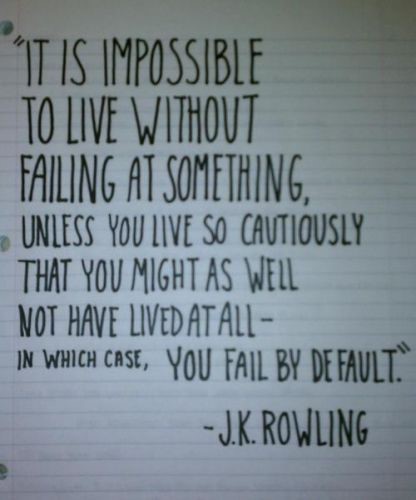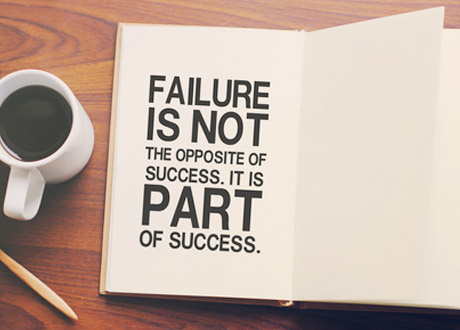by Melissa (Student Blogger: MA English Literature)
Understanding One Another
Everyone constitutes failure differently. For one person, failure could be sleeping through an exam. For another, it could be missing their expected grade by a half a mark. We all recognise what failure means for ourselves, but it can be hard to stay focused on what matters to us as individuals, especially when working near others in an academically competitive environment.
If you are the type of person for whom missing your expected grade is a sign of an impending apocalypse, you might struggle to understand why your flatmate is shrugging off their own disappointment with a night on the town. Vice versa, if you are the optimistic type who is confident that you can right these wrongs in the next assessment (so why panic about missing the mark now, you got this!), you might be getting a little frustrated with your flatmate down the hall who is sobbing over their ‘Not-An-A’.
This post is about coming to understand how others define failure, and what we can do to help each other overcome our frustrations.
Firstly, we need to accept the past. It happened. You messed up and it hurts to think about it, we have all been there. But what happens next? We can take one of two options here, option one is to bury our memories of the experience and never think about it again. Option two (the preferred option) is to swallow the embarrassment and take a good hard look at what went wrong and revise those issues for next time, thus improving our chances at future success.
Sometimes, it might have been a case of ‘why’ did this go wrong rather than ‘what’. Everyone has bad days and distracting emotions can sneakily turn our hard work against us. I personally struggle with maintaining the correct levels of criticism towards my work if I am experiencing a bad day or week; It can be hard to quantify the importance of perfect academic formatting if I know my family are having problems back home. Our personal lives may occasionally obstruct the path to success and that is understandable, but it is not acceptable to account every failure to the goings on in the world around you. You have direct input in your work and it is important to work hard to minimise the effects of the unexpected (such as personal or family illness) affecting your studies. This includes being aware of the opportunities you have to seek help when lightning does strike, such as extensions on essays and counselling, and knowing when to use these tools.
My Story
It can be hard to get back up again following a bout of failure, trust me, I know. It has been no less than five years since I took my first (and only) driving test which I failed irreparably. Irrelevant of the expected shame that holds hands with any failure, the test turned into a rather harrowing experience when my examiner decided to turn part of his reasoning as to why he had failed me as explained by my ‘lack of wanting to drive’, amongst other comments, which was ridiculous. I wanted to succeed in my driving test so I could take a break from my lessons which had been going for a year. I would not have sunk my savings into all those lessons hand I not wanted to succeed in my test. I would not have aced my theory if I didn’t want to drive.
My examiner took my test as an opportunity to belittle someone who needed his approval, to make a personal attack on my feelings and aspirations as opposed to staying professional and factual in his position. Honestly? I have always had a fear of driving (or being driven) down hills following a recurring nightmare from when I was little. My attempt to learn to master that fear and take so many lessons had been difficult, but positive. I entered that car feeling determined, a year of practise behind me.
I left it knock-kneed and shaking, some older man sat in the passenger seat smirking.
And we have all had an experience such as this one, an experience which goes above and beyond your average failing. One which was originally a couple of mistakes you understand and can rectify (check wing mirrors more often, drive slower) turned personal nightmare. And no, this is not a case of sore loser syndrome. I’ve cried over Cs, swallowed those tears, moved on, got help and improved. Social tactics gone wrong when I’ve said the wrong thing and offended someone, it happens, we get over it together. I dropped a whole roast dinner on the floor last year and I am glad to say that my fiancé didn’t take the opportunity to tell me, ‘I don’t think you even wanted to eat roast dinner in the first place.’
I don’t appreciate when someone misuses their power to make themselves feel strong at the expense of others, it is unprofessional, childish, and only serves to hurt people, as opposed to giving them the best chance to improve.I haven’t driven since, and I see this itself as a failure because I have allowed that one experience to get the better of me. I am taking actions to rectify it this summer by taking new lessons, but I’ll always struggle to forgive those examiners who take their students failing personally and angrily, as it not conducive to our progression as a society.
Stay strong!
 We can help each other to overcome failure by being supportive during times of hardship. This can be as little as offering to make your flatmate a brew if they’re working hard, or listening to their troubles if you know they are struggling. If you are in the same course, it can be useful to compare your work post-grading so you can learn not only from your own academic failures, but those of others too. By sharing our stories we can improve together.
We can help each other to overcome failure by being supportive during times of hardship. This can be as little as offering to make your flatmate a brew if they’re working hard, or listening to their troubles if you know they are struggling. If you are in the same course, it can be useful to compare your work post-grading so you can learn not only from your own academic failures, but those of others too. By sharing our stories we can improve together.


 by Klaudia (Student Blogger: BBA Hons International Business Management)
by Klaudia (Student Blogger: BBA Hons International Business Management)  by Will (Student Blogger: BSc Hons Entrepreneurship and Management)
by Will (Student Blogger: BSc Hons Entrepreneurship and Management)  by Maria (Student Blogger: MSc Management)
by Maria (Student Blogger: MSc Management) 


 We can help each other to overcome failure by being supportive during times of hardship. This can be as little as offering to make your flatmate a brew if they’re working hard, or listening to their troubles if you know they are struggling. If you are in the same course, it can be useful to compare your work post-grading so you can learn not only from your own academic failures, but those of others too. By sharing our stories we can improve together.
We can help each other to overcome failure by being supportive during times of hardship. This can be as little as offering to make your flatmate a brew if they’re working hard, or listening to their troubles if you know they are struggling. If you are in the same course, it can be useful to compare your work post-grading so you can learn not only from your own academic failures, but those of others too. By sharing our stories we can improve together. by Anna (Student Blogger: BA Hons French and Linguistics)
by Anna (Student Blogger: BA Hons French and Linguistics) by Melissa (Student Blogger: MA English Literature)
by Melissa (Student Blogger: MA English Literature)